 Petzlover
Petzlover Both American Bobtail and Savannah are originated from United States. Both American Bobtail and Savannah are having almost same weight. Both American Bobtail and Savannah has same life span. Both American Bobtail and Savannah has same litter size. American Bobtail requires Moderate Maintenance. But Savannah requires Low Maintenance
Both American Bobtail and Savannah are originated from United States. Both American Bobtail and Savannah are having almost same weight. Both American Bobtail and Savannah has same life span. Both American Bobtail and Savannah has same litter size. American Bobtail requires Moderate Maintenance. But Savannah requires Low Maintenance
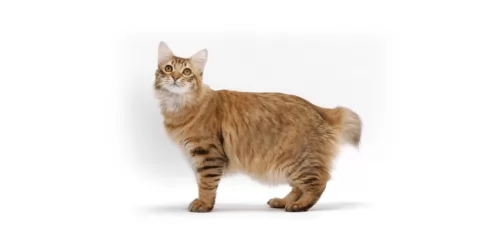 Bobtailed cats have a naturally shortened tail due to natural genetic mutation. The cat’s original appearance genetics were modified so as to bring about an improved strain that comes in all colors and coat types.
Bobtailed cats have a naturally shortened tail due to natural genetic mutation. The cat’s original appearance genetics were modified so as to bring about an improved strain that comes in all colors and coat types.
The cat descended from a short-tailed kitten, Yodi. His kittens also had a short tail. Two women selectively bred the cats to be large and strong with a wild look but with a pleasant nature.
The cats used in the development of the breed were domestic shorthairs and longhairs. They are now pedigreed cats without tails.
In 1989, the International Cat Association accepted the American Bobtail into its new breed category, giving it full recognition in 2002. They were accepted for registration by the Cat Fanciers’ Association in 2000. This is the world's biggest registry of pedigreed cats.
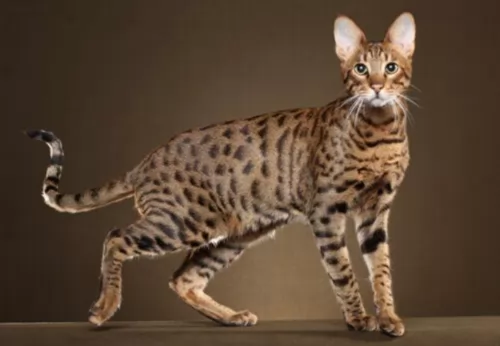 Savannah cats have been bred to look like a Serval but it is essentially a domestic cat. The first Savannah cat was born in the United States in April 1986. The person who was successful in making this happen was Judee Frank.
Savannah cats have been bred to look like a Serval but it is essentially a domestic cat. The first Savannah cat was born in the United States in April 1986. The person who was successful in making this happen was Judee Frank.
She bred a Serval wild cat and a Siamese cat and they produced a female kitten with the name of Savannah – named after the African savannas from where the serval cat comes from.
It will take your Savannah kitten about 3 years to reach his adult size. The Savannah will give birth to up to 6 kittens. The cat was recognized by TICA in 2001.
Today when you’re looking to buy a Savannah kitten, you’ll notice the cats are always described with a filial number, for example, F1, F2, F3, F4, and so on. The filial number describes the generation a cat comes from.
Because this cat belongs to a hybrid group, the feline is banned in a number of states and cities in the United States of America.
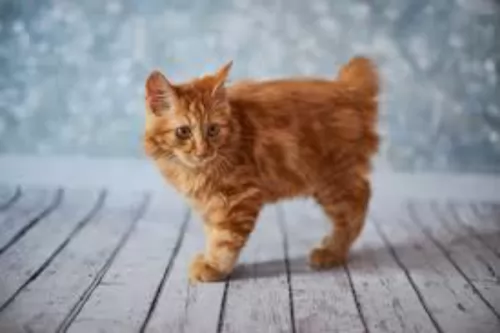 The American Bobtail is a cat that came about in the 1960s. It is well know as the cat with a bobbed tail. It’s not as vocal as many other cat breeds. It’s not a slender cat but is sturdy and and strong weighing between 3 and 7kg. Their double coats can be short- or long-haired. The coat comes in different patterns and colors, including orange, cream, black, brown, chocolate etc with a shaggy texture. He sheds quite a bit. The body of the American Bobtail is faily long. Its ears are medium-sized and wide-based with rounded tips, the eyes are almond shape. The eyes can be gold, yellow, green or blue. What is interesting is that the hind legs are much longer than the fore legs, and the feet are round.
The American Bobtail is a cat that came about in the 1960s. It is well know as the cat with a bobbed tail. It’s not as vocal as many other cat breeds. It’s not a slender cat but is sturdy and and strong weighing between 3 and 7kg. Their double coats can be short- or long-haired. The coat comes in different patterns and colors, including orange, cream, black, brown, chocolate etc with a shaggy texture. He sheds quite a bit. The body of the American Bobtail is faily long. Its ears are medium-sized and wide-based with rounded tips, the eyes are almond shape. The eyes can be gold, yellow, green or blue. What is interesting is that the hind legs are much longer than the fore legs, and the feet are round.
Bobtails are friendly cats, enjoying being in the company of their human family as well as with strangers. They are loving and affectionate to the entire family as opposed to just one person.
They’re quiet cats but will chirp when happy and excited. They get on well with all members of their human family and that includes children and the dogs.
They’re intelligent cats too and they can be taught to walk on a leash and to also perform some tricks. There are some people who say that their Bobtails act more like dogs than cats. These cats are sensitive and can sense when their owners are happy or sad and will come and sit with you when you're feeling sad and alone.
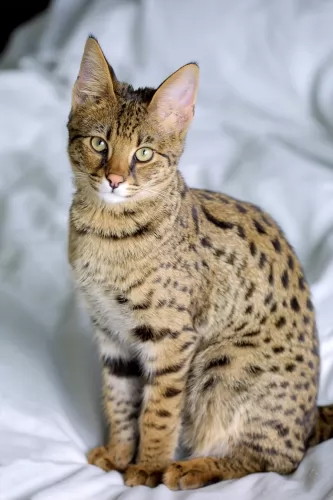 The Savannah Cat is a fairly large cat that weighs anything from 3 to 8 kg. It is a cross between a domestic cat and one of Africa’s smaller wild cats, the Serval.
The Savannah Cat is a fairly large cat that weighs anything from 3 to 8 kg. It is a cross between a domestic cat and one of Africa’s smaller wild cats, the Serval.
Because of the Serval in the mix, the Savannah cat is able to leap into the air too because of his long legs. The cat has a short tail, and similar to the Cheetah has tear markings running from the corner of the eyes down to the whiskers.
A striking feature of this cat is his hooded eyes and the large ears. The Savannah cat has exotic looks and is regarded as a low maintenance cat with its short fur. The coat is tawny-colored with black spots but it comes in 4 background colors – smoke, silver, brown, and black.
An interesting aspect with the Savannah Cat is that they are sometimes compared to dogs. They become loyal pets and companions and will follow their owners around and can even be trained to walk on a leash.
The Savannah is an intelligent cat and can be taught a trick or two. Because the Savannah cat is a hybrid, they aren’t predictable in nature. Some are friendly and social while others are more wild and hostile. Some of them don’t like meeting strangers and will growl and hiss with uncertainty.
They enjoy playing in water and it will be a good idea to invest in a paddling pool for this cat’s outdoor enclosure. It’s an active cat and will require daily exercise. It is better suited to homes where there are older children.
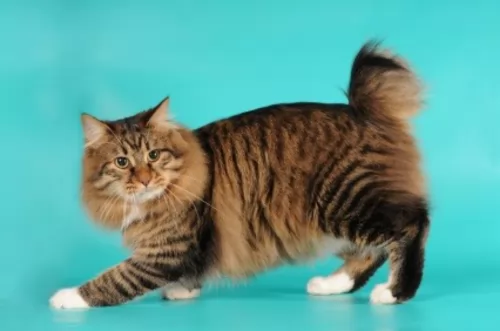 Many people want a dog as a pet but aren’t able to keep one and then the American Bobtail becomes the ideal alternative. These cats aren’t known for their solitary personalities like the many other cats there are and they genuinely love to spend time with their human family. Some will even behave like a dog and be there to meet you at the door when you arrive home.
Many people want a dog as a pet but aren’t able to keep one and then the American Bobtail becomes the ideal alternative. These cats aren’t known for their solitary personalities like the many other cats there are and they genuinely love to spend time with their human family. Some will even behave like a dog and be there to meet you at the door when you arrive home.
He is a fairly large, amicable cat and is affectionate and adaptable to your lifestyle. He enjoys all kinds of lifestyles and loves to curl up next to you on your travels, being the perfect road trip companion.
The American Bobtail is a therapeutic cat and is sensitive to the moods of its human family. He gets on well with children and other pets in the family and just wants to be a family member.
By bringing an American Bobtail into your home and your heart, you’ll have discovered the most wonderful feline companion there is.
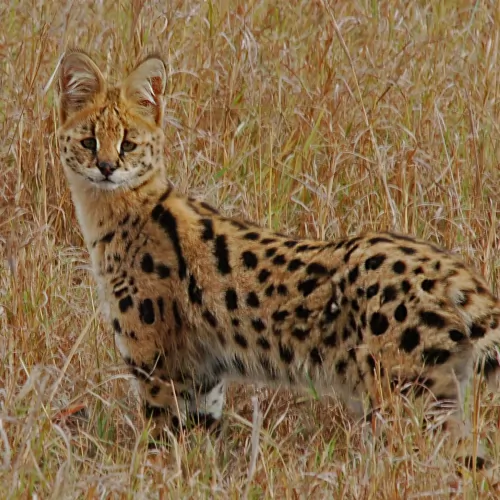 The Savannah cat's temperament is exceptional, and when you’ve got a Savannah in your home, you’ve got a true companion.
The Savannah cat's temperament is exceptional, and when you’ve got a Savannah in your home, you’ve got a true companion.
Cat lovers who have owned one of these cats will tell you that this cat is similar to a dog in many ways. The intelligent cat will follow his owners around and be a friendly, loyal, and devoted companion.
With so much intelligence, beauty, and energy, this cat has all the qualities of a splendid feline companion.
The Savannah will form a particularly strong bond with the human family member who grooms and feeds him.
Everybody who has known the social, affectionate, loyal cat has nothing but good words to say and he may just be the cat companion you want.
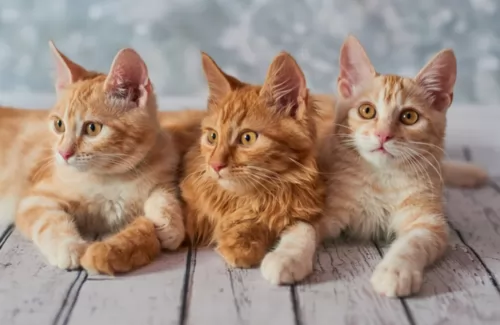 When you buy a kitten from a breeder, always do research on the breeder so as to avoid a host of health issues down the line.
When you buy a kitten from a breeder, always do research on the breeder so as to avoid a host of health issues down the line.
Apart from the typical cat health problems, the Bobtail is a healthy breed of cat. With proper care from you at home as well as veterinary care, these interesting looking cats can live up to anything between 12 and 20 years.
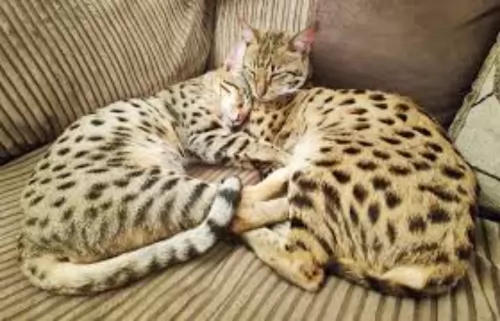 The Savannah is generally a healthy cat. The cat can also fall prey to some of the typical cat illnesses there are -
The Savannah is generally a healthy cat. The cat can also fall prey to some of the typical cat illnesses there are -
Allergies happen with cats when their immune systems become sensitive to certain things. Cat allergies can be environmental, from fleas or from food allergies.
While some allergies may come and go, others will require an examination by the vet as they can include itchy skin problems. Typical allergy symptoms include sneezing and coughing, runny eyes, diarrhea and vomiting.
This is a gastrointestinal disorder. Cats of any age are affected but it is found more in older cats. Chronic inflammation of the gastrointestinal tract can come about because of a food allergy for instance or parasitic or bacterial infection. Your Savannah cat will be vomiting and lethargic and have diarrhea and weight loss.
These are parasites that invade the small intestines of a cat. It can cause anemia and inflammation of the small intestine. Hookworms can produce symptoms such as weight loss, coughing, and diarrhea as well as skin irritations.
This condition causes thickening of the muscular walls of a cat’s heart. The heart’s left ventricle is thickened. The heart can beat rapidly and this results in more oxygen usage. It can also lead to oxygen starvation which causes heart cells to die off. A condition known as arrhythmia develops where the heart beats irregularly.
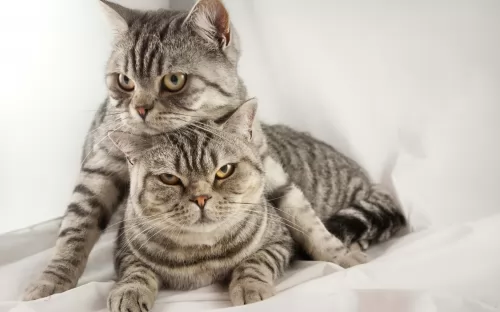 Keep a close eye on your cat’s weight.
Keep a close eye on your cat’s weight.
Keep the litter box of your Bobtail scrupulously clean.
Your American Bobtail needs the best quality food there is full of vitamins and minerals if he is to remain healthy. The cat’s diet will depend a lot on his activity levels and general health, but it should always be high protein food. Your vet will always help you with some guidelines on feeding your cat.
Every cat needs exercise, and even though these cats aren’t as energetic as other cats, they are active indoors and out and are also playful. You will need to provide it with some puzzle toys and a climbing tree to keep him mentally and physically active.
Brush his medium-length fur twice a week to keep it shiny and silky.
Trim his nails carefully and check his eyes and inside his ears for abnormal discharges.
Vaccinate your cat to keep it protected from life-threatening cat diseases and take him to the vet immediately you suspect something is wrong.
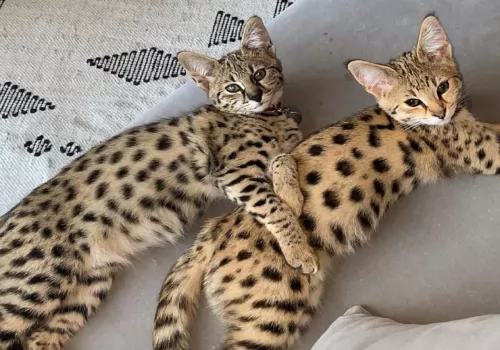 The Savannah cat's diet needs to be a high-quality type of food with efficient levels of protein and taurine. The reason for this is that all cats are carnivores. A properly balanced raw diet will be the best nutritionally balanced food you can provide.
The Savannah cat's diet needs to be a high-quality type of food with efficient levels of protein and taurine. The reason for this is that all cats are carnivores. A properly balanced raw diet will be the best nutritionally balanced food you can provide.
The Savannah has a short coat, which makes him low maintenance. He will still need to be brushed once a week. This will ensure a healthy sheen, and it will remove loose hairs and dust.
Provide for this intelligent cat’s physical and mental stimulation. He will need a variety of interactive toys. You yourself, need to become involved with your feline friend and give him a game too.
Make sure your Savannah is up-to-date with all his vaccinations. If you’re in any doubt about your pet’s health and wellbeing, get him to the vet who can provide you with valuable information on his health and his diet to ensure optimal health for your feline friend.